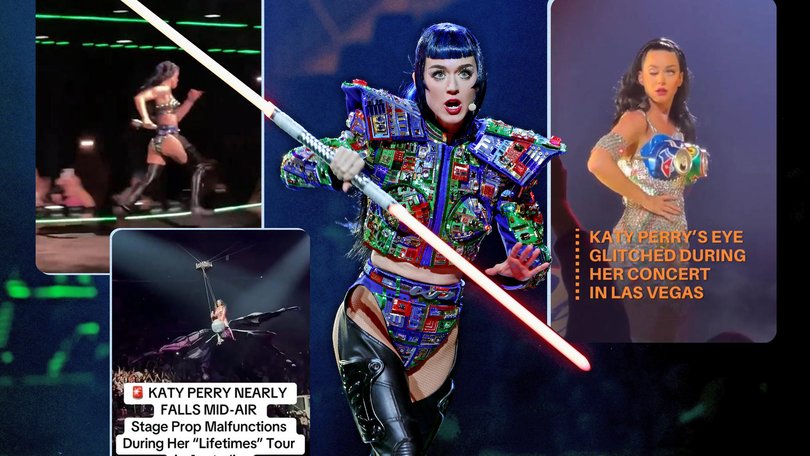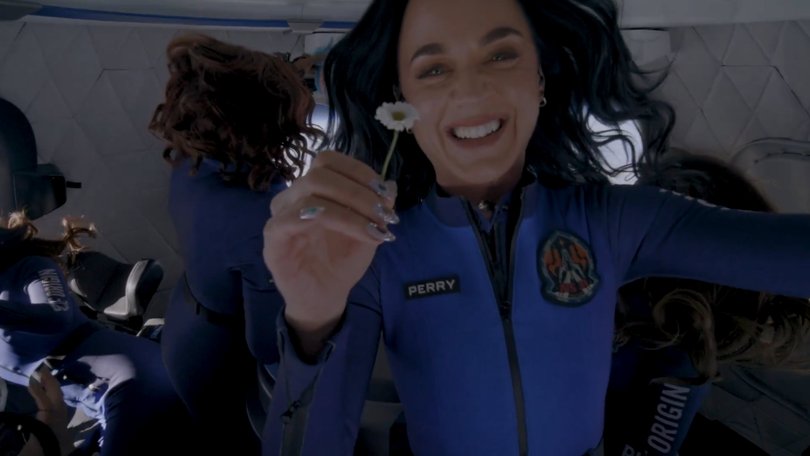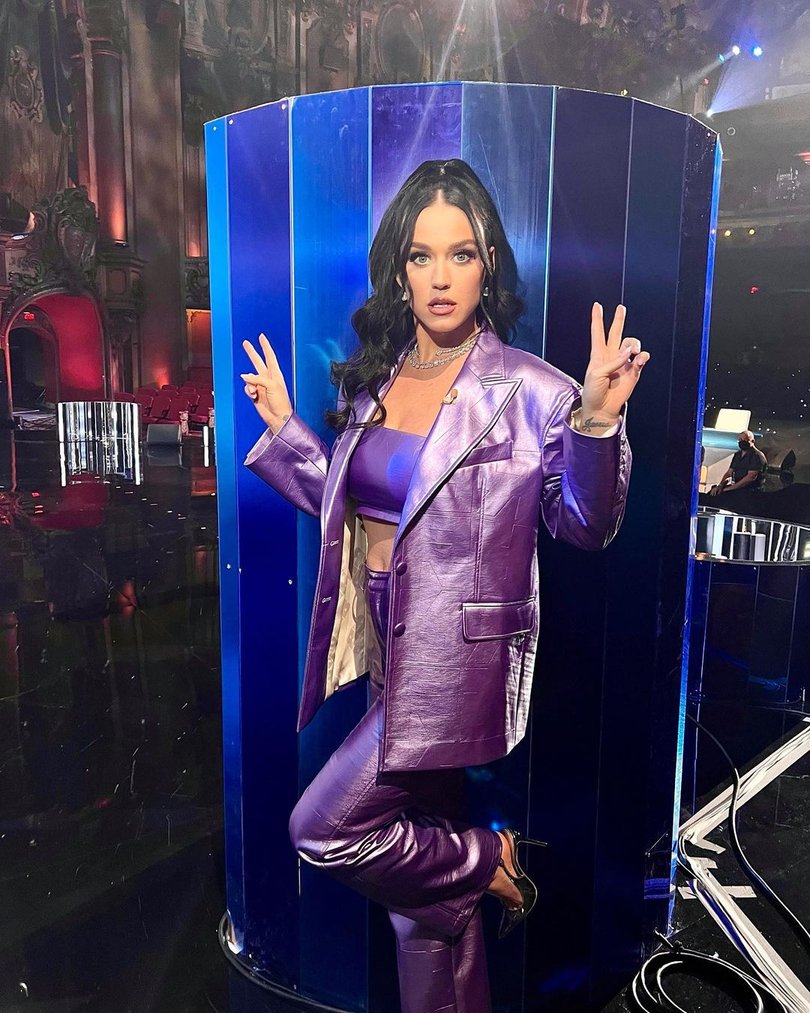THE WASHINGTON POST: The Katy Perry paradox - How the ‘washed up’ pop star is still raking in millions
THE WASHINGTON POST: The internet would have you think Katy Perry’s career is in shambles. But her tour is raking in millions. How should we parse this complex phase in a pop star’s arc?

Inside the Kia Forum in July, Katy Perry flew around the arena on wires, somersaulting as she sang Nirvana, a track from her most recent album. During I Kissed a Girl, she flipped inside a metal sphere, and for her global hit anthem Roar, she took flight on an animatronic butterfly.
While belting E.T., a smash hit from 2010, she battled monster aliens (backup dancers) in a sparkly bodysuit while wielding a neon lightsabre; the storyline of the two-hour show was that Perry was in a video game and saving the world from an evil mastermind.
The packed crowd in the nearly 18,000-capacity venue cheered and screamed. “Ka-ty! Ka-ty! Ka-ty!”
Sign up to The Nightly's newsletters.
Get the first look at the digital newspaper, curated daily stories and breaking headlines delivered to your inbox.
By continuing you agree to our Terms and Privacy Policy.Outside the arena, on the internet, the reaction had been very different. In April, Perry, kicked off her Lifetimes Tour to an onslaught of mockery.
“Katy Perry’s ‘Cringe’ Concert Debut Roasted by Fans,” the Daily Beast said, highlighting social posts making fun of her choreography. “People are paying to see this?” Page Six wrote in a headline, quoting a nameless critic on X. One viral TikTok, representative of many videos, slammed her robotic dancing and aerial work; over a clip of Perry soaring on the cable wires, a voice-over said snarkily, “Hanging for dear life just like her career.”
Despite what the internet would have you believe, Perry’s career seems just fine. Perhaps to prove this, her management slipped the numbers to Billboard last week: The tour has grossed more than $80 million and sold 1.1 million tickets so far and international demand spurred her to add more dates in France, Australia and China. After a break following the US leg, which wrapped in August, the tour resumes in South America this weekend.
But seeing Perry in person versus her current online persona - a bumbling singer making constant gaffes as she fights to stay relevant - was a reminder of the challenges facing pop stars in 2025, where you are whatever social media says you are. And Perry’s past year has been one of the most illuminating case studies in how fast a celebrity’s reputation can fall online.
Perry’s Los Angeles concert took place a year after she released Woman’s World, the single that launched a disastrous rollout of her panned seventh studio album, 143, last fall. A teaser of the song’s rudimentary lyrics (“Sexy, confident / So intelligent / She is heaven sent”) were so poorly received that some fans initially insisted it was written by artificial intelligence or that Perry was playing a prank.
Positioned as an empowerment anthem, a music video featuring Perry dancing around in bikinis left viewers confused, even after she explained it was supposed to be a sarcastic jab at the male gaze. She received no shortage of criticism for working on the record with Dr Luke, the producer whom Kesha accused of sexual assault. (Later, Perry clarified that he was “one of many” collaborators on the project.)

The problems kept accumulating. She filmed a music video in ecologically protected sand dunes in Spain; she got further entangled in a legal dispute with the previous owner of her Montecito estate; and took part in the now-famous Blue Origin all-female spaceflight, which was criticised as a tone-deaf spectacle for the uber-wealthy. (Jeff Bezos, the founder of Blue Origin, owns The Washington Post.) Amid it all, earlier this year she split from actor Orlando Bloom, her long-time fiancé and the father of her 5-year-old daughter. (A recent dinner date with former Canadian prime minister Justin Trudeau got paparazzi and tabloids buzzing; the nature of their relationship remains unclear.)
While many celebrities don’t publicly acknowledge criticism thrown their way, Perry addresses it directly.
“Hold on, hold on, no, no, no ... This is not what the internet says is going on!” Perry said at one point in Los Angeles, beaming to the audience, which had erupted into applause. “This is real life, is what it is.”
She made a similar remark at her concert in Chicago in May: “Well, I thought I was the most hated person on the internet. I think that’s false.”
Perry, 40, has always been tuned in to the discourse. In 2010, journalist Vanessa Grigoriadis profiled Perry for her first Rolling Stone cover story. In the opening paragraphs, the writer described Perry looking up her name on Google, spotting a false rumour about herself on gossip sites, and instantly heading to Twitter to clear it up to her 3 million followers.
“It was a reminder that she’s a connector, she’s a person who needs back and forth with the audience all the time,” Ms Grigoriadis said in an interview. “She’s conversationally ravenous, and that’s part of what helped her career early on.”
A major element of the pile-on is that Perry has been unable to meet this cultural moment. “It’s a mismatch of where she was as a person and an artist, and where the culture is moving to,” Ms Grigoriadis said. These days you can’t just film a goofy video - Perry’s specialty since the days she shot whipped cream out of her bosom for California Gurls - and expect everyone to laugh along like they used to do. Sabrina Carpenter, Addison Rae and Tate McRae have sharpened their identities as the new breakout pop stars, and established superstars such as Taylor Swift, Beyoncé and Lady Gaga are evolving with their fan bases.
One thing that is certain for celebrities - especially women, especially ageing pop stars, who are always held to higher standards - is that when the online masses decide they want you to fail, the spiral can seem endless, Ms Grigoriadis said. “Once the hate starts against you ... it’s pretty hard to stop it.”
Perry grew up in a religious household in Santa Barbara, California, before moving to Los Angeles at age 17. From the stage, she told her hometown crowd (which included her parents, business partners, dog groomer, ear, nose and throat doctor and gynaecologist) about her humble beginnings. She was so broke that she couch-surfed all over the city; her car was repossessed. At a fancy dinner with friends, she ordered a side salad and water, and when someone suggested everyone split the bill, she went to the bathroom and cried because her debit card was declined. But nothing was going to stop her dreams.
“I didn’t care what people said about me back then, and I don’t care now,” Perry said, emphasizing each word as her fans roared. (Perry’s publicist did not respond to a request for comment for this story.)
Backlash is not a new phenomenon for Perry. Kristin Lieb, author of Gender, Branding, and the Modern Music Industry, hates to see pop stars savagely criticized online for minor mistakes, especially when they own up to them. Perry is different, though: a star who has become so well known for being defensive about the instances when she has offended people that it has become part of her brand.
“It has been the rule rather than the exception,” said Professor Lieb of Emerson College. Any celebrity can blunder into a cultural blind spot, she said, but it’s up to them to compensate for it and do better. “I think she’s been less than stellar with that.”
Perry, originally positioned as a Christian singer, took off in the mainstream around 2008 with her debut single, I Kissed a Girl, a phenomenon in part because of the controversy around it, some finding offence in lyrics stating that same-sex kissing was “not what good girls do.” (Her smart-alecky song Ur So Gay drew even more outrage.) Perry, who has established herself as a supporter of LGBTq+ rights (in LA, she dedicated I Kissed a Girl to the gay community, who “raised me, dressed me, glammed me, danced with me, believed in me and held me and had my back since I was 17”) has since said she would “edit” some of the lyrics due to stereotypes.
Her 2010 album Teenage Dream, loaded with hits from the title track to the inspirational Firework, rocketed her to pop stardom, and fans loved her campy Betty-Boop-in-Candy-Land aesthetic. But as she drew criticism for cultural appropriation - such as when she dressed like a geisha at the American Music Awards - Perry appeared to grow resentful.
In her 2014 Rolling Stone cover story, she defended herself from those who believed the curvaceous mummy costumes on her tour objectified Black women, saying that was never her intention. “I guess I’ll just stick to baseball and hot dogs, and that’s it,” she told the magazine, a quote she predicted would backfire. “But can’t you appreciate a culture?”
She still had hits, charming audiences with her shark-dancing Super Bowl performance, and garnering sympathy when her 2012 documentary Part of Me captured the dissolution of her marriage to comedian Russell Brand, who asked for a divorce via text message.
But the real downturn may have started around her much-derided 2017 album Witness, when Perry declared she wanted to pivot to “purposeful pop” amid the toxic political atmosphere - only the album didn’t really say anything meaningful, and she continued her public missteps. One incident occurred during an Instagram Live, when a fan said they missed Perry’s trademark black hair (she had dyed it blonde) and she responded, “Oh, really? Do you miss Barack Obama as well? Okay, times change.”
The following year, Perry joined ABC’s American Idol as a judge, and the platform in front of millions of viewers weekly wasn’t always positive. In her first season, she landed in hot water when she surprised a 19-year-old contestant with his first kiss, a moment criticised as out-of-touch in the #MeToo era.

MJ Santilli, who runs the reality TV competition site Mjsbigblog, recalled that Perry was clearly cast as the “wacky” judge. Although Ms Santilli didn’t always agree with Perry’s opinions, she thought the singer genuinely tried to help contestants and offered astute feedback. But Ms Santilli noticed that the amount of negative headlines spiked during her time on the show. When Perry did anything slightly awkward, the media would pounce and call it a controversy.
Ms Santilli thought those pieces had misogynistic undertones, and believes that coverage could have added to the cloud around Perry’s image, which helped lead to this current moment. “Her super fans are always going to love her, but your regular person observing pop culture may turn on her,” Ms Santilli said.
Even in low times, an army of loyal followers will still show up for a pop diva. Perry has the Katy Cats. Shortly after the Blue Origin flight blowback, a group of fans bought her a billboard in Times Square congratulating her on the first week of her tour. Perry left a long Instagram comment on a fan page and assured them she was okay, and also blamed the toxicity of online discourse.
“When the ‘online’ world tries to make me a human Piñata, I take it with grace and send them love, cause I know so many people are hurting in so many ways and the internet is very much so a dumping ground for unhinged and unhealed,” she wrote. “What’s real is seeing your faces every night, singing in unison, reading your notes, feeling your warmth.”
At the Kia Forum, they arrived in droves, men and women in their 20s and 30s, dressed in tour T-shirts and cat headbands, candy-colored wigs and sequins. Many parents escorted their young daughters, including one 6-year-old’s birthday party that arrived via bus.
Perry did seem to crave the human connection; her show included a segment where people could vote on songs for her to perform. The first one was Not Like the Movies, about a breakup, probably not her favourite topic at the moment. “I wrote this in my 20s after my first divorce,” Perry explained. “And I will try to hold my composure while I sing it a week before my period.”
She chatted with several young attendees and invited them onstage for The One That Got Away, and her father joined, too. “When I grow up, I want to be like Katy Perry,” he told the audience.
Right before the closing song that asked whether you ever feel like a plastic bag, drifting through the wind, wanting to start again, Perry turned her attention to her fans: “Thank you for showing up, and showing me what’s real.”
© 2025 , The Washington Post
